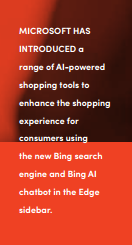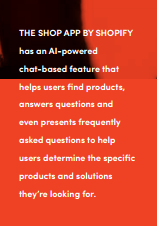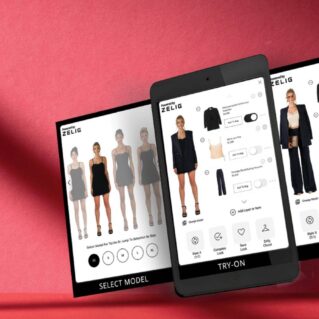How AI-powered shopping next levels the customized experience.
The online shopping experience continues to evolve rapidly, and staying on top of effective trends is crucial to understanding what consumers expect and need. Aggregated products, review summaries and the ability to quickly compare details are all being streamlined.
Microsoft has introduced a range of AI-powered shopping tools to enhance the shopping experience for consumers using the new Bing search engine and Bing AI chatbot in the Edge sidebar. One of the key features is the automatic aggregation of products within each category. Users can effortlessly compare similar items and review product specifications, facilitating customized buying guides.

The tools provide direct information on where to buy, with Microsoft earning an affiliate fee for each transaction. While this evolution could streamline the search and shop experience, it could negatively impact independent editorial content and affiliate marketing and avenues such as blogs and review sites.
“What do those mean for shoppers? Saving time, saving money and easily finding products you might not have known you needed,” noted an article on ZDNet. “Previously, searching a general term like ‘work from home supplies’ would bring up links to already published online guides. But with this new feature, Microsoft’s AI will compile a list of things a remote worker might use; compare similar products and models; and give details and pricing on those products.”
The AI-generated review summaries condense online product reviews, so users don’t have to wade through lists of irrelevant reviews. With a simple query to Bing Chat in Edge, users can obtain valuable insights from consumer sentiments. Price Match is another powerful new tool allowing users to request price matches, even after prices drop. The list of collaborating retailers is set to expand over time.
The Shop app by Shopify has an AI-powered chat-based feature (Shop.app/ai) that helps users find products, answers questions and even presents frequently asked questions to help users determine the specific products and solutions they’re looking for.
For example, when searching for a “greens supplement,” the app presents three options with brief descriptions and purchasing links with product images. It also asks follow-up questions users can click on such as “Which greens supplement has the most nutrients?” then recommends a product with a brief description. The experience feels like a personalized assistant helping users focus on their unique needs and questions without pushing irrelevant products. The feeling of having a conversation is key.

“AI-powered conversational commerce aims to further personalize the shopping experience,” shared an article by VentureBeat. “With access to a wealth of data, AI assistants can learn about a customer’s preferences, making it easier to find products that they will love. Such personalization is limited with traditional ecommerce platforms, which rely on generic product recommendations.”
This chat-based shopping is referred to as Natural Language Understanding (NLU) and even mimics a customer’s tone or speaking pattern. Combing augmented reality and virtual reality in the near future could humanize the experience even more.
“Together, these technologies can trick your eyes, ears and brains into believing that you’re standing right next to that shopping assistant, or even your favorite celebrity, talking about things to buy or not,” said Gupshup CEO Beerud Sheth in the VentureBeat article. “Going shopping with friends will have a whole new meaning when those ‘friends’ are virtual shopping agents.”
From the September 2023 issue of Direct Selling News magazine.


